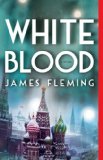Summary | Excerpt | Reviews | Beyond the Book | Read-Alikes | Genres & Themes | Author Bio

This article relates to White Blood
James Fleming was born in
London in 1944, the fourth in a
family of nine children. His
education began with a
governess, Miss Malins, who
"wielded power via a thick, blue
oval crayon that would be jabbed
into our ribs if ever we
faltered." At the age of eight
he was sent to boarding school
at
Abberley Hall. He got into
Oxford "by a whisker" and gained
a second in Modern History.
On graduation, he became an articled clerk
(trainee accountant) and
went to work with Angus &
Robertson, an Australian
publisher with an office in
London.
Since the age of 10 he had been
interested in being a writer,
and during his twenties had
experimented with three or four
ideas for books about everyday
products (such as A Social
History of Tea), but none came
to anything. He put writing
aside when he got married, had
children, started a one-man
publishing house and took over
the family farm on the death of
his father. But in his fifties,
with his children grown and his
marriage broken, he found time
to start writing The Temple of
Optimism set in Buxton,
Derbyshire in the 1780s, which
was published in 2000. This was
followed by Thomas Gage
in 2003, set in
Norfolk, England about 150 years
ago during the early period of
the railways. White Blood
was published in the UK in 2006
and the USA in early 2007.
When asked about writers who
have influenced him, Fleming
names Nabokov, Tolstoy,
Bulgakov, Isaac Babel,
Stevenson, Conrad, Joyce Cary,
Camus, Saul Bellow and "the most
individual of all writers in
English" – Laurence Sterne.
Useful to know?
Fleming talks
about his writing
"I write because I must. It’s
the only valid reason for doing
something that is so antisocial.
I write first in longhand, on
one side only of a pad of white,
ruled, A4 paper (letter-sized
paper) with a Pilot V5
Extra Fine pen. I like the
scoring sound of the nib; the
triumph of completing a page and
laying it to one side;
scratching a line through duff
words; the formation of certain
letters in the alphabet. I like
the sense of progress that comes
from manually numbering a page.
And I know that anything I
compose straight onto a PC will
be total rubbish – cheap, slack
and sometimes even juvenile. I
cannot understand why it should
be, but it is. Writing is not a
burden to me: I find no need to
bribe myself. My only necessity
is to be facing a blank wall: a
window or picture is fatal."
![]() This "beyond the book article" relates to White Blood. It originally ran in February 2007 and has been updated for the
September 2008 paperback edition.
Go to magazine.
This "beyond the book article" relates to White Blood. It originally ran in February 2007 and has been updated for the
September 2008 paperback edition.
Go to magazine.
Finishing second in the Olympics gets you silver. Finishing second in politics gets you oblivion.
Click Here to find out who said this, as well as discovering other famous literary quotes!
Your guide toexceptional books
BookBrowse seeks out and recommends the best in contemporary fiction and nonfiction—books that not only engage and entertain but also deepen our understanding of ourselves and the world around us.